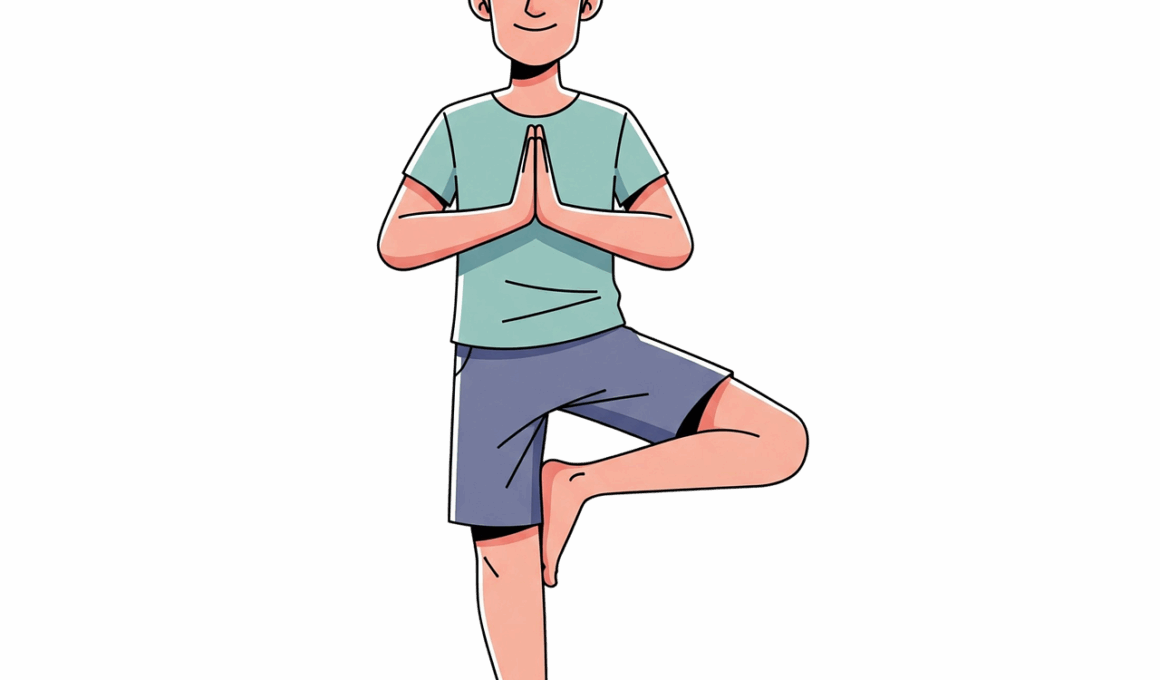Flexibility as a Natural Mood Enhancer
Flexibility training offers numerous mental benefits that significantly enhance mood and overall emotional well-being. Improved flexibility is often associated with physical health, but it also plays a crucial role in mental clarity and emotional stability. By engaging in regular stretching routines, individuals may experience a decrease in symptoms of anxiety and depression. This can create a greater sense of well-being by promoting the release of serotonin, a natural mood stabilizer. Additionally, flexibility training can lead to improved body awareness, enabling individuals to feel more connected to their bodies. When one is in tune with their physical state, it often results in heightened self-esteem and a positive outlook. Moreover, this type of training can serve as a form of mindfulness practice, encouraging individuals to focus on their breathing and bodily sensations. This focus can reduce stress levels and foster a relaxed state of mind. When flexibility exercises are incorporated into daily routines, the benefits compound, leading to sustained improvements in mental health. Ultimately, investing in flexibility can yield dividends not just physically, but more importantly, mentally.
One should consider that flexibility training doesn’t just enhance physical movements; it prepares the mind for the day ahead. When stretching, individuals often find themselves unwinding from the stresses of daily life, which can be therapeutic. For many, a dedicated stretch routine can facilitate a more positive outlook by breaking the cycle of negativity and stress. Embracing this practice allows people to create a routine that acts as a moment of self-care. It’s a reset button that opens the door to mindfulness. Regularly engaging in flexibility training promotes psychological resilience, meaning practitioners are less likely to be overwhelmed by setbacks. The practice encourages practitioners to listen to their bodies, leading to improved physical awareness while also fostering emotional control. As flexibility increases, so does the capacity for deep breathing, which is linked to reduced anxiety levels and enhanced relaxation. This emphasis on the breadth of breathing naturally leads to mental clarity, making decision-making easier and less fraught with worry. Thus, embracing flexibility training not only incentivizes physical benefits but transforms the mental landscape to support a healthier and happier individual.
The Impact of Stretching on Mental Health
When discussing the mental benefits of flexibility training, it is essential to recognize how stretching influences mood. Scientific research supports that stretching exercises help release endorphins, which elevate mood and act as natural painkillers. Regular engagement in flexibility workouts can help combat feelings of frustration, anxiety, and tension. The more the body loosens up, the easier it is for the mind to let go of accumulated stress. A dedicated stretching session encourages individuals to slow down, promoting a sense of peace and clarity. As practitioners progress in flexibility, they often report feelings of vivid energy and happiness, correlating with the mind-body connection. Moreover, flexibility training enhances circulation, ensuring that oxygen and essential nutrients effectively reach the brain. This improved blood flow can sharpen mental faculties, fostering better focus and concentration. Incorporating flexibility movements, such as yoga or Pilates, into one’s regimen promotes not only a supple body but also a sharper mind, equipped to handle daily challenges. As one cultivates flexibility, they also nurture a stronger mental foundation, able to accommodate various emotional states with grace.
The integration of flexibility training into daily life can significantly augment the mental aspects of emotional resilience. Consistent practice instills discipline, making practitioners more authentically themselves and allowing for deeper self-reflection. This cultivation of discipline translates into a better capability to manage life’s unpredictables. When facing challenges, a flexible body can parallel a flexible mind, easing reactions to stressors. Engaging the body in gentle stretching fosters a stronger emotional response to life’s uncertainties. The meditative aspect of stretching offers a reprieve from racing thoughts—a much-needed break in fast-paced living. Through this practice, individuals learn to maintain a sense of humor amid adversity, reinforcing their mental fortitude. Practitioners often report feeling more grounded and capable of steering through turbulent emotions. Furthermore, those who regularly indulge in flexibility training often cultivate better relationships, as they become more present and connected with others. As social interactions improve, so does the emotional state. Being flexible in both body and mind can enhance quality of life, creating joyful moments worth celebrating. Investing in regular flexibility routines can endow individuals with a gracefulness that extends beyond physical abilities.
Mind-Body Connection through Flexibility
The interrelation between mental health and physical flexibility is profound and transformative. When individuals stretch and work on their flexibility, they engage with their bodies in ways that illuminate the connection to their emotions. Each time a person pushes their limits during a flexibility session, they are not just enhancing their physical capabilities—they are challenging their mental outlook as well. By overcoming discomfort during stretching, one cultivates courage, fortitude, and resolve. This resilience can translate to various life aspects, providing confidence to face challenges head-on. The rhythmic and intentional nature of stretching allows for a clearer thought process, creating a space for positive self-dialogue. One may find that over time, this practice reduces negative self-talk, a common barrier for many seeking emotional well-being. Furthermore, participating in group stretching or yoga sessions fosters community, which can enhance feelings of belonging and mutual support. The power of communal practice should not be underestimated; being around like-minded individuals creates a shared energy that uplifts spirits. Achieving personal flexibility goals alongside others amplifies commitment and encourages long-lasting habits, deeply reinforcing the mind-body connection.
Participation in flexibility training can significantly motivate individuals to take charge of their mental health. When positive physical changes occur, they can often be seen as a catalyst for deeper emotional shifts. Each small improvement in flexibility can lead to a more optimistic perspective, reinforcing the belief that positive changes are attainable in various life areas. This sense of achievement nurtures a growth mindset, essential for emotional development. Moreover, as one becomes more compassionate toward their bodies during flexibility training, this compassion extends to their thoughts and feelings. Practitioners learn to embrace their imperfections and treat themselves with kindness. Through consistent practice, individuals may notice an increase in self-acceptance and a reduction in self-critique. Cultivating gratitude for one’s body opens pathways to mental wellness; individuals begin to create a more balanced relationship with self-image. As flexibility progresses, individuals often reflect deeper on their accomplishments, accumulating wins that enhance self-esteem. Routine flexibility sessions become powerful affirmations of their capabilities. Ultimately, flexibility training serves as a gateway to rich mental benefits, painting a picture of resilience and emotional stability.
Embracing a Flexible Lifestyle
Embracing flexibility training creates a harmonious balance in life between mind and body. Consider this not just as a physical exercise, but a lifestyle shift that enhances emotional well-being. An integrated routine of stretching and mobility exercises can contribute to a positive mental state, making individuals more adaptable to changing circumstances. This adaptability fosters agility in thinking, improving problem-solving skills during life’s unpredictable moments. Regular practice reinforces a proactive approach toward mental challenges, instead of a reactive mindset, deeply beneficial for personal growth. Engaging in flexibility training also encourages the development of patience and persistence, essential qualities in overcoming obstacles and hardships. Consequently, practitioners become more resilient, learning how to better cope with stress and life’s challenges. This nurturing approach toward oneself enhances overall happiness levels, promoting a more joyful existence. Moreover, embracing flexibility in life encourages individuals to explore new activities and experiences, enhancing creativity. The path of becoming more flexible physically offers numerous opportunities for emotional growth, leading to enriched relationships and fulfilling life adventures. Ultimately, a commitment to flexibility training not only improves physical prowess but cultivates a profound connection to emotional well-being.
To conclude, flexibility training is a profound tool for maximizing mental benefits and enhancing overall happiness. When individuals prioritize their physical flexibility through consistent training, they unlock various psychological advantages that improve quality of life. This practice serves as a gentle reminder that relaxation and mindfulness lead to brighter days. As physical limits expand, so do mental horizons, presenting opportunities for personal development and emotional growth. The empowerment felt through enhanced flexibility opens the door to self-discovery and bravery, making it easier to face adversities with a more lighthearted demeanor. Maintaining a dedicated flexibility training practice creates a foundation for resilience that becomes habitual over time. Embracing this lifestyle promotes a more nuanced understanding of both body and mind, bridging the gap between the two. Consequently, individuals experience not only a transformation in their physical capabilities but also a flourishing of their mental well-being. The articulation of flexibility becomes integral in adapting to life’s experiences, helping cultivate a rich emotional fabric. Therefore, investing in a regular flexibility routine is an investment toward a balanced and fulfilling life—one where the mind and body work together in beautiful synergy.


